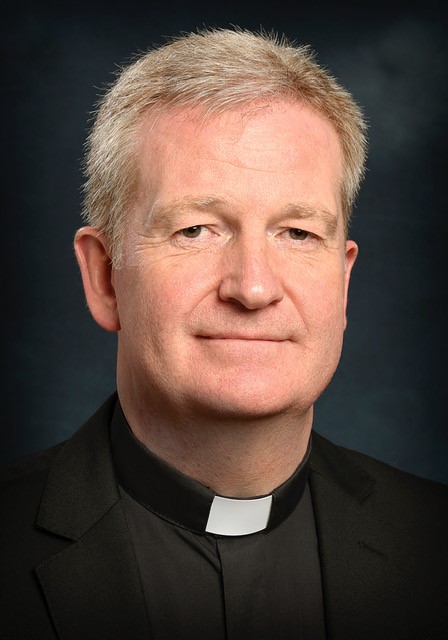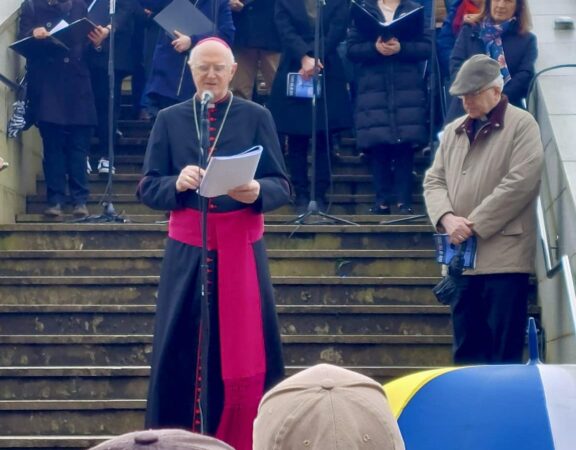Launch of “Year 1 Report” on Crosscare Information and Advocacy Services
Speaking notes of Most Rev. Diarmuid Martin Archbishop of Dublin
Crosscare Centre, Sackville Place, Dublin, 23rd July 2014
Many years ago, I was involved in the course of my work, in assessing requests for financial assistance from development programmes in different parts of the world. I was very struck by the difference in the quality of the requests that we received. Some requests were about good causes but were vague, weak in detail and not well written: these were quickly put for the moment into the “parking” tray. Others were well written, with good descriptions of the work being done and clearly aware that their work was very much in line with the priorities of the funding agency. These were the ones which quickly made it to the “fast track” tray.
A very wise and experienced superior called me to one side and he said: be careful. The well presented requests were probably written by experts in fund raising and most likely by people who know more about how to fill-in the forms correctly than about the reality of poverty at local level. The men and women who were doing good work at local level were quite possibly the ones who had more important things to do with their time than filling-in the detail which the funding agency bureaucrats felt obliged to ask.
These were wise words of advice and they apply not just when looking for funds from development agencies. People living in poverty are not often good at presenting their story well and very often end up not just getting funds they need to access, but indeed not even getting what are their basic rights.
That is why I like this initiative of Crosscare in providing information and support and advocacy for those who in today’s Ireland find themselves not just on the margins of society, but effectively marginalised in society.
People are often scandalised when I say that I do not like Catholic organisations which say that their task is to be “the voice of the voiceless”. That seems a noble idea and a necessary ideal. What have I got against it? For me the task and real aim of a Church-run social service and advocacy structure is not to be the voice of the voiceless but to ”give the voiceless their own voice”, to accompany them to the point in which they can speak for themselves.
One of the largest-ever studies of poverty in the developing world was one carried out by the World Bank in the late 1990’s entitled Voices of the Poor. When people living in poverty were asked what the most important thing that they wanted in life was and what they considered the most significant thing that would help them to move out of poverty, the answer was overwhelmingly one word: Voice.
They found that not having a voice of their own left them permanently marginalised and prey to the corruption, the arrogance and the inefficiencies of the very systems which were there to provide them with protection and support.
The Crosscare Information and Advocacy programme sets out to respond to the situation of those who come to this centre by enabling them to effectively access available services themselves. The poor very often suffer from an inability to have access to services which are their very right. We all have had experiences of our own inadequacy when we find ourselves in unfamiliar and frightening situations. It has often happened us that we are offered services which are below standards and which do not respond to our needs and we get about half of what is our right. But we are unable to deal with the complex situation and we go away actually saying “thanks” to those who have not really responded to what we need. Just imagine the sense of inability to react which strikes those who are already marginalised!
In today’s world of politically correct language we like phrases like “user friendly”, but very often that term is defined by ourselves and may not respond to the real felt-needs of the user. In today’s Ireland many men and women who may have been managing to make ends-meet now find themselves in situations of great precariousness and through a combination of insecurity and shame at their predicament find the environment of social assistance centres off-putting and alien and unfriendly. For immigrants the whole world of our services can feel alien and hostile. Social services of any kind, voluntary, statutory or charitable, which leave people humiliated, have failed in their task. A Church run social service never has clients: it works with brothers and sisters who seek the level of dignity in their lives which we take for granted.
I think of that extraordinary gesture of Pope Francis who at the General Audience saw a man whose face was covered in sores. The Pope stopped and came over to the man. Unlike what we probably would have done, Pope Francis did not engage the man from a careful distance about what disease he had and how long he had had it: he simply kissed him.
Modern communications technology can bring new efficiency to the delivery of social services, but distance communication can never replace the nearness to suffering and alienation which the message of Jesus requires. When we speak of the Church having a preferential option for the poor, we are not talking about a political programme. We are talking about an attribute of God’s activity. Without real contact with the realities of the poor and the excluded we will never enter fully into the logic of the God revealed in Jesus Christ.
The service which has been established here brings together a range of existing Crosscare services. It must become an advocacy service with a difference. It is not an advocacy service about services or even about people: it is an advocacy service which places people at its centre and its aim is to enable those who are marginalized – regardless of creed or ethnic identity – to regain their sense of dignity and to have the voice and the means to begin the road of return.
Crosscare is the Dublin Diocesan Social Service Agency and its origins have their roots in the early 1940’s, during the Second World War, precisely in bringing together the then existing agencies to work more effectively. I am very pleased to note Crosscare’s ability and desire constantly to evaluate the effectiveness of the work it undertakes and to see that it responds to the new and changing needs of those who experience poverty and marginalisation in today’s Ireland.
We need greater policy coherence. I remember being involved in preparing a Vatican document on homelessness back in the 1990’s. When I received the first draft, I spoke to the author and said that this was a document about a whole range of social issues and not really focussing in homelessness. The author replied that you can only understand the question of homelessness within the context of the wide range of factors which contribute to it. Homelessness is a sort of thermometer of the overall social climate. If that is the case, the current crisis of homelessness in Ireland is in fact an indication of a more widespread failure of social policy.
We live in a very challenging social climate in Ireland. The level of homelessness in what is a wealthy Dublin is shameful. The level of precariousness regarding accommodation, especially for families, is worrying. The Department of Social Affairs and the local authorities battle for financial means and for more enlightened housing policy. We face one of the paradoxes of many developed societies: we have increased homelessness and we have unoccupied housing; we have people hungry and enormous quantities of food are thrown away daily.
Having addressed with some success the complex question of working towards Ireland’s economic recovery, I believe that from today onwards the overriding challenge of government in this country must be to address in a broad perspective the social consequences of Ireland’s economic policy and to identify measures to redress the disadvantage which the vulnerable have suffered.
Reading the Crosscare report, it is important to note how Crosscare is not afraid to point out failures in the way in which public services respond to the needs of those who turn to them and to look closely the reasons why such services fail to respond at times even to legal entitlements. But the overall tone of the Report – and this I welcome – is one which looks towards cooperation and working together. It is good to see that testimonies of support for this initiative of Crosscare come from all sectors. Cooperation is vital in the future and social reform in Ireland can only be the result of fruitful partnership between government and civil society.
Pope Francis challenges the Church to renew its response to the challenge of poverty. The task is not just to assist the poor but to work for the inclusion of those currently living in poverty as protagonists into society. Pope Francis places this challenge in characteristically straight talk: “Any Church community, if it thinks that it can comfortably go its own way without creative concern and effective cooperation in helping the poor to live with dignity and reaching out to everyone, will risk breaking down, however much it may talk about social issues and criticize governments. It will easily drift into a spiritual worldliness camouflaged by religious practices, unproductive meetings and empty talk”.
I am pleased that Crosscare is there to lead the Church in Dublin to respond to the Pope’s challenge. ENDS
Click here for Year 1 Crosscare Information & Advocacy Report:









